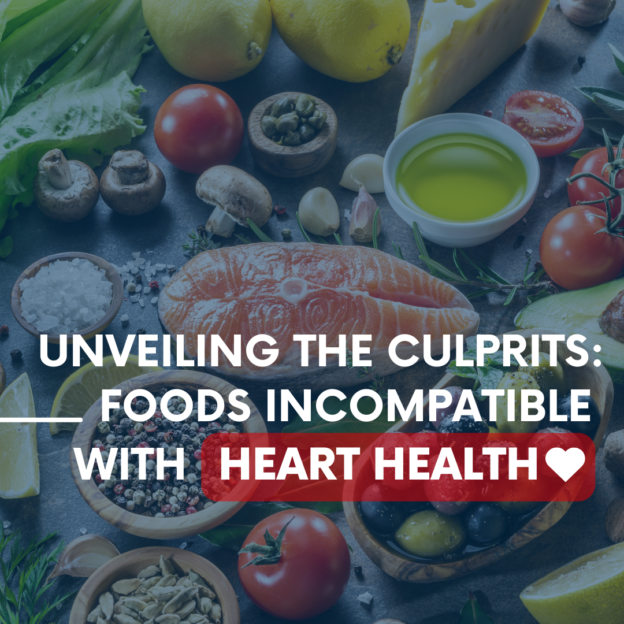
Staying on the same theme as our previous newsletter, what foods are incompatible with heart health? ❌
While incorporating heart-healthy foods is important, it is equally crucial to be mindful of what to avoid. Let’s talk about these foods you want to keep away for a healthy heart:
1. Added sugars
These sugars are those that hide in your foods under creative names like “agave nectar”, “barley malt”, or the poetic “evaporated cane crystals”. They are digested and absorbed quickly, so they spike blood glucose and insulin levels, contribute to oxidative stress and formation of glycated proteins. Sugary beverages, candies, and processed foods are common culprits, but the largest intakes come from sliced bread and breakfast cereals! Be mindful of labels and choose natural sources of sweetness like fruits to satisfy your sweet tooth.1
2. Trans fats
Trans fats are artificially created fats often found in processed and fried foods. These fats can raise levels of bad cholesterol (LDL) while lowering levels of good cholesterol (HDL), thereby increasing the risk of heart disease. Check food labels for partially hydrogenated oils, a common source of trans fats, and opt for healthier alternatives.2
3. Satured fats
Although
some saturated fats are essential to the body, excessive consumption can
contribute to high cholesterol and heart disease. Foods rich in saturated fats
include red meat, full-fat dairy products and certain tropical oils such as
coconut oil. Choose lean meats and low-fat dairy products to reduce your intake
of saturated fats.3
4. Excessive sodium
High sodium intake is linked to hypertension and increased risk of heart disease. Processed foods, canned soups, and fast food often contain high levels of sodium. Opt for fresh, whole foods, and use herbs and spices for flavoring instead of relying on excessive salt.4
5. Refined carbohydrates
Foods with refined carbohydrates, such as white bread, pastries, and sugary cereals, can contribute to inflammation and weight gain. Choose whole grains, fruits, and vegetables to provide your body with essential nutrients and fiber.5
6. Processed meats
Processed
meats like bacon, sausages, and hot dogs often contain high levels of sodium
and saturated fats. Moreover, the curing process can introduce harmful
preservatives. Limit your intake of processed meats and opt for lean protein
sources like poultry, fish…6
7. Alcohol in excess
And finally, of course, excessive drinking can lead to high blood pressure, heart failure, and other cardiovascular issues.
Maintaining a heart-healthy diet is essential for overall well-being, and making conscious choices about the foods we consume plays a pivotal role in cardiovascular health. A heart-healthy diet isn’t just about what you add to your plate; it’s equally about what you choose to limit or avoid. Being mindful of these choices is a significant step in the right direction for heart health.7
The right supplements may also contribute to a healthy heart! InSea2®, an ingredient from the brown seaweeds may help maintain a healthy heart! It does so by acting on the 5 pillars of metabolic health: Body Composition; Blood Glucose; Blood Pressure; HDL Cholesterol; Triglycerides.
If you’re interested in this style of subject, sign up for our newsletter 📩
If you want more information, contact us!
1 James M. Rippe and Theodore J. Angelopoulos (2016) Relationship between Added Sugars
Consumption and Chronic Disease Risk Factors: Current Understanding. Nutrients.
https://www.ncbi.nlm.nih.gov/pmc/articles/PMC5133084/
2 Antwi-Boasiako Oteng and Sander Kersten (2020) Mechanisms of Action of trans Fatty
Acids. Elsevier. https://www.ncbi.nlm.nih.gov/pmc/articles/PMC7231579/
3 Lee Hooper at all (2020). Reduction in saturated fat intake for cardiovascular disease. Cochrane Library [online]. Available on : https://www.ncbi.nlm.nih.gov/pmc/articles/PMC8092457/
4 Yi-Ji Wang (2020). Sodium Intake and Risk of Cardiovascular Disease: A Systematic Review and Dose-Response Meta-Analysis. Nutrients [online]. Available on : https://www.ncbi.nlm.nih.gov/pmc/articles/PMC7601012/
5 Harvard T.H. CHAN. Whole Grains [online]. Available on : https://www.hsph.harvard.edu/nutritionsource/what-should-you-eat/whole-grains/
6 Piet A. van den Brandt (2019). Red meat, processed meat, and other dietary protein sources and risk of overall and cause-specific mortality in The Netherlands Cohort Study. Journal Européen
d’Epidémiologie [online]. Available on : https://www.ncbi.nlm.nih.gov/pmc/articles/PMC6451725/
7 Center for Disease Control and Prevention (2024). Alcohol Use and Your Health [online].
Available on :